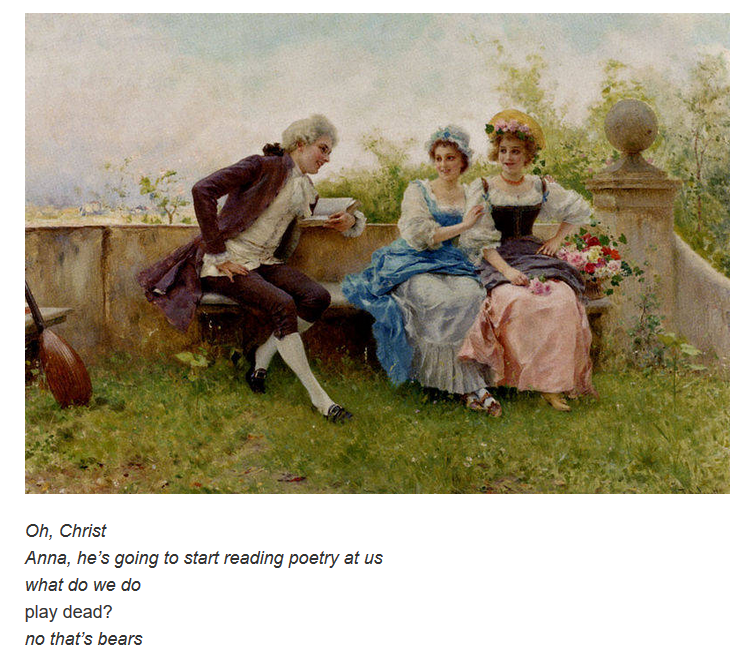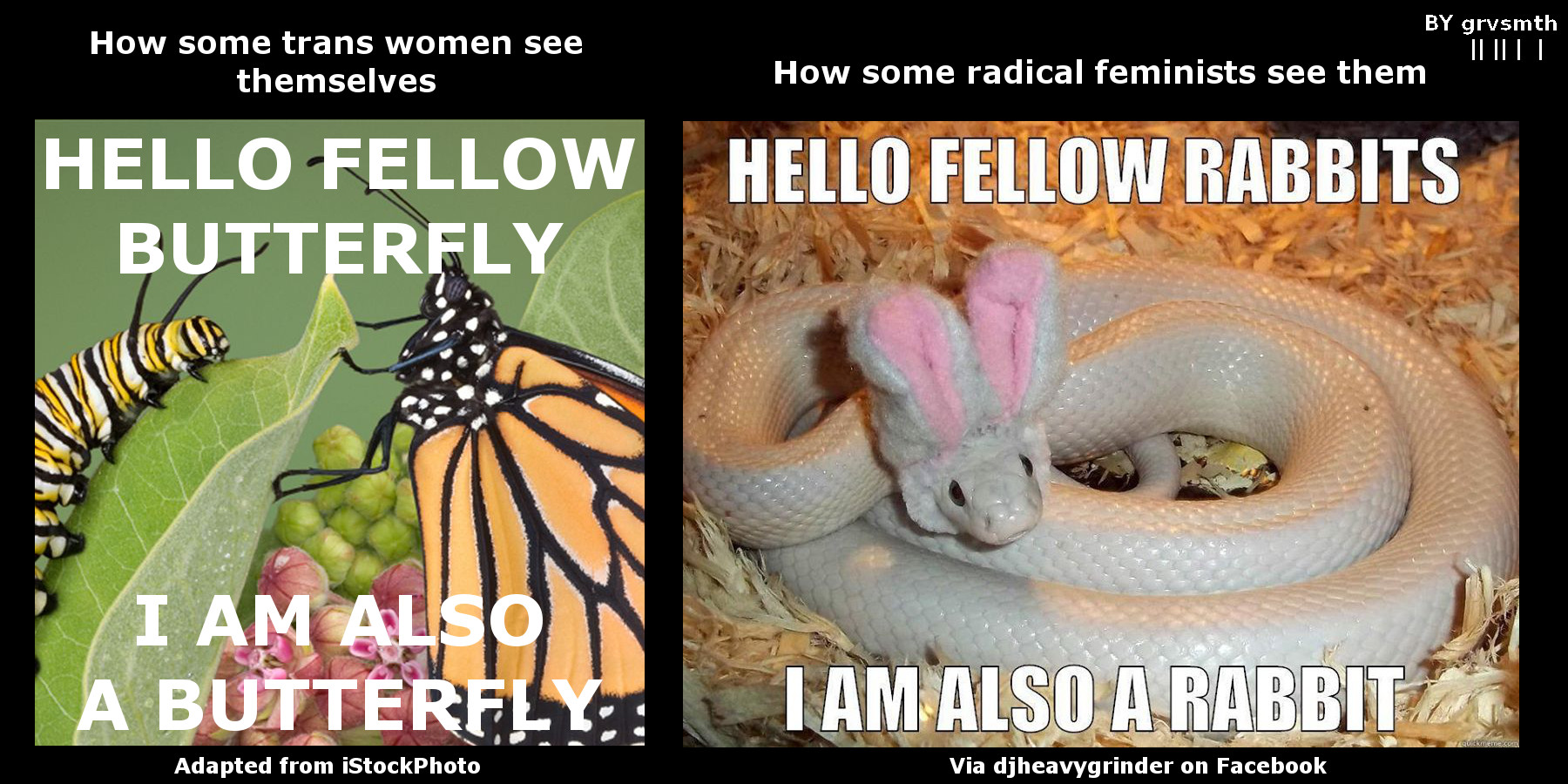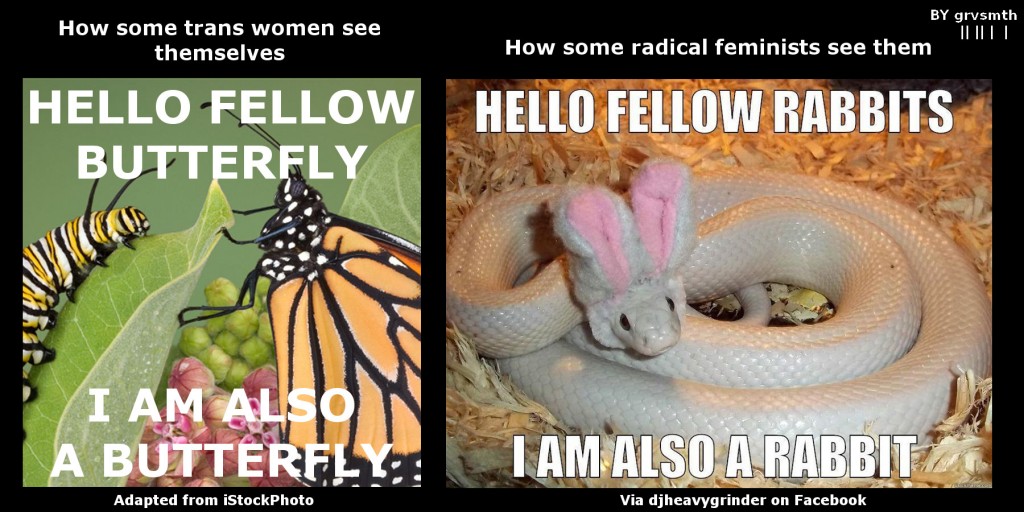Last month I was dancing with some friends at a local karaoke bar. Some guy started dancing with a trans woman friend of mine, in a very grabby, smothery kind of way. I could tell my friend wasn’t enjoying it, so I cut in and danced with her in a fun, Platonic way. I was presenting as a guy that night, and Mr. Handsy didn’t seem at all interested in me. Later in the evening, after my friend had gone home, I saw the same guy doing the same thing with another friend of mine, a non-transitioning trans man, and I cut in again with him.
Seeing my friends’ experiences brought back memories of feeling sexy surrounded by men on the dance floor, and then going back to my seat after those men’s hands slipped too far down along my dress. That, and memories of being followed by guys who said filthy things in my ear, and hearing from women about similar experiences, and worse.
There’s another class of gender interactions that doesn’t rise to the level of borderline assault that I saw on the karaoke dance floor, but that women find unpleasant and frustrating. It’s the kind captured by Rebecca Solnit’s essay “Men Explain Things to Me,” by Mallory Ortberg’s Western Art History series for The Toast, and by Nicole Gugliucci’s tweet about “hepeating.”
So what does this have to do with transgender feelings, beliefs or actions? We trans women are accused of having an unrealistic view of women’s lives, and often with good reason. Many of us form our ideas about womanhood from a distance. We fantasize about becoming fictional women like Ariel the Little Mermaid, or celebrities with highly crafted media personas like Marilyn Monroe. We do have contact with real live women, but we are often uninformed about important aspects of women’s experiences. In our fantasy of women’s life it doesn’t hurt to wear heels, a short skirt will attract the right partner, we’ll always be taken seriously, and men will revere us.
When we confront these fantasies with a real taste of the special frustrations of women’s lives, it can give us pause. In my case, awareness of these realities contributed to my decision not to transition. The realization that living as a woman wouldn’t automatically resolve all the difficulties that just come with being human in the world led me to decide to continue living as a man most of the time.
When people who’ve lived as men lack that basic understanding of the daily experiences of women’s lives in our society, their actions in relating to men can seem puzzling at best, and often selfish or malicious. Why do they go to the bathroom in groups? Why don’t they just say no? Why do they dress sexy, but then say no? We don’t see the bind that many women are in, forced to choose between attracting and rejecting, and punished both for pursuing partners and for not having a partner. Some of us don’t figure out the answers to these questions until we’ve been on the other side of the interaction.
It doesn’t help that from an early age we are taught to see women as inherently stupid and irrational in many ways. They aren’t, of course. Some people are in fact stupid, irrational, selfish or even malicious, and some of those people are women. It can be hard to distinguish that individual irrationality or selfishness from rational, even compassionate actions that are skewed by our misogynist social structures.
Now here’s the tricky part: all those minor interactions I mentioned, like mansplaining and hepeating and the courtship behavior mocked by Ortberg? The same principles apply to them. At an early age we are taught to see men as particularly overbearing and oblivious in many ways. Some people are in fact overbearing, inconsiderate, selfish or even malicious, and some of those people are men. It can be hard to distinguish that individual obliviousness or malice from conscious, even generous actions that are skewed by our misogynist social structures.
Why do men like to show off to women? Why do they keep calling after a woman says no? Why do they say they’ll call but then don’t? We don’t see the bind that many men are in, forced to choose between pursuing and waiting for a woman to defy convention, and punished both for showing off and for not competing aggressively enough.
Some people don’t figure out the answers to those questions without being on the other side of the interaction. Ortberg’s work in particular has always demonstrated a striking contrast between its keen insight for the experiences and feelings of women, and its shallow, judgmental understanding of the experiences and feelings of men.
When trans men have a taste of the special frustrations of men’s lives, it can give them pause. Trans men have spoken publicly about experiencing male privilege from the male side, and about how even men with firsthand experience of women’s lives and the desire for equality can be stymied by the misogyny entrenched in our social structure. One trans guy I talked to had been preoccupied with looking tough, both living as a woman and as a man, but was still shocked when he saw a woman cross the street at night to avoid him.
The fact is that many trans men form their ideas about manhood from a distance, fantasizing about fictional characters or celebrities with highly crafted media personas. Nothing shows this clearer than Daniel Mallory Ortberg’s interview with Heather Havrilesky. Ortberg gushes about the glamour of Captain Kirk and Brendan Fraser and Deep Springs College. He talks about relationships and discussions with women and non-binary people and his parents as a unit and someone named Brook, but he never mentions having a face-to-face discussion with an identifiable man about what it means to be a man.
In this fantasy of men’s life, large muscles can be had with no effort or health consequences. Everyone admires a guy in a bowtie and a colorful shirt, no matter how short he may be. As long as a man’s intentions are pure, his authority will be respected. Everyone will recognize that he is thoughtful and caring, and no one will ever question his motives. In every interaction with women there is an obvious way to balance gender equality with our other needs and wants, and to see it all you need to do is pay attention.
When trans men lack that basic understanding of the daily experience of men’s lives in our society I have to question why they want to be men, just as I questioned my own desire to be a woman. Men unquestionably have privilege, and on a basic level of safety and economics a certain desire to transition is always understandable. But anyone who is not making a decision based on faith or survival owes it to themself to go beyond the fantasy and examine the realities of the choices before them.
Ortberg kinda sorta acknowledges this, in a response to a question from Havrilevsky:
Does it sometimes feel like you’re joining the other side, the enemy, MEN?
Yeah, like, I’m taking my skills and opportunities to Cleveland. Or like “Men are good now.” Or I’m going to fix something. Or what I’m doing is in some way a commentary on ways in which men and women relate to one another, or some kind of statement on the work I’ve done before, the position I inhabited as a woman feminist. Yeah, that’s been anxiety-inducing, especially because: Men as a group? Not fantastic. White men as a group? I don’t have a sense that I will be met with safety and joy on the other side.
First of all, white men as a group? We have not taken a poll on how to meet Ortberg when he finally decides he’s ready to interact with us. This is what has always puzzled me about Ortberg: he seems too well-read to confuse structural bias with collective decision-making, and yet he does confuse it even here, after examining gender for years.
Second, if so much of your past work has been about the ways in which men and women relate to one another, then yes, any public action you take that regards gender is a statement on that work and a commentary on those ways of relating.
Third, if men aren’t good, why become one? Because you’ve somehow mystically determined that it’s your destiny? That’s just as stupid as the Bible study teacher who somehow mystically determined that Ortberg’s destiny was not to wield authority over men.
Do I welcome Ortberg to manhood with safety and joy? Well, safety is a given. And I bear him no ill will for his prior work. When I first read “Women Having a Terrible Time,” I took it as one woman commiserating with and comforting others based on their limited experiences with these creatures called men. I’m okay if some women have an arms-length relationship with manhood. Whatever gets you through the night.
I have to say, in terms of understanding and empathizing with men, I kinda do expect more from a man. But as Ortberg continues to learn and experiences life as a man firsthand, I’ll be interested to see if he goes back and revises his work on gender relations, or builds on it in a way that recognizes the humanity of men. And yeah, he should probably have done that before he “started to access different aspects of medical transition.” In any case, let’s see how it goes.







